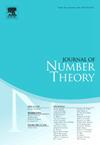本福德定律和随机整数分解与全同停止条件
IF 0.6
3区 数学
Q3 MATHEMATICS
引用次数: 0
摘要
本福德定律是关于数据集中每个数字作为首位数字出现的频率的声明。各种常见的整数序列,如斐波那契数、阶乘和大多数整数的幂,都符合该定律。在本文中,我们证明了由随机积分分解过程(我们将其建模为离散的 "断棒")产生的整数序列,在满足一定的同位停止条件后,会渐近地接近本福分布。我们还证明,我们对定义同余停止条件的同余类数量的要求是本福德行为发生的必要条件,也是一个临界点;偏离这个临界点会导致截然不同的行为。本文章由计算机程序翻译,如有差异,请以英文原文为准。
Benford's law and random integer decomposition with congruence stopping condition
Benford's law is a statement about the frequency that each digit arises as the leading digit of numbers in a dataset. It is satisfied by various common integer sequences, such as the Fibonacci numbers, the factorials, and the powers of most integers. In this paper, we prove that integer sequences resulting from a random integral decomposition process (which we model as discrete “stick breaking”) subject to a certain congruence stopping condition approach Benford distribution asymptotically. We also show that our requirement on the number of congruence classes defining the congruence stopping condition is necessary for Benford behavior to occur and is a critical point; deviation from that would result in drastically different behavior.
求助全文
通过发布文献求助,成功后即可免费获取论文全文。
去求助
来源期刊

Journal of Number Theory
数学-数学
CiteScore
1.30
自引率
14.30%
发文量
122
审稿时长
16 weeks
期刊介绍:
The Journal of Number Theory (JNT) features selected research articles that represent the broad spectrum of interest in contemporary number theory and allied areas. A valuable resource for mathematicians, the journal provides an international forum for the publication of original research in this field.
The Journal of Number Theory is encouraging submissions of quality, long articles where most or all of the technical details are included. The journal now considers and welcomes also papers in Computational Number Theory.
Starting in May 2019, JNT will have a new format with 3 sections:
JNT Prime targets (possibly very long with complete proofs) high impact papers. Articles published in this section will be granted 1 year promotional open access.
JNT General Section is for shorter papers. We particularly encourage submission from junior researchers. Every attempt will be made to expedite the review process for such submissions.
Computational JNT . This section aims to provide a forum to disseminate contributions which make significant use of computer calculations to derive novel number theoretic results. There will be an online repository where supplementary codes and data can be stored.
 求助内容:
求助内容: 应助结果提醒方式:
应助结果提醒方式:


